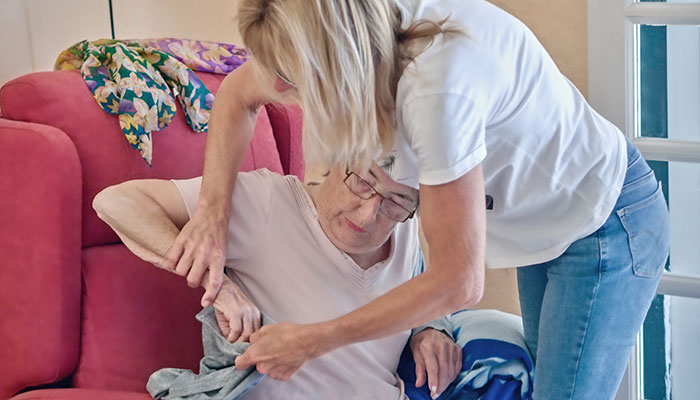Adaptive clothing

If you have dressed a relative with dementia or assisted a family member with Parkinson’s, you know there are challenges involved. Dressing requires physical coordination, fine-motor skills, flexible joints, and range of motion. Not being able to dress oneself is both frustrating and embarrassing. Fortunately, clothes designers have developed garments with important adaptations.
Adaptive clothing typically incorporates these features:
- Easy closures. Look for snaps, hook-and-loop fasteners, Velcro, or magnets. (Avoid magnets if your loved one has a pacemaker.)
- Pull-over shirts or dresses that have no closures. With broader necklines and loose sleeves, there is no need to fuss with buttons or zippers. These garments do, however, require the ability to lift one’s arms above one’s head.
- Elastic waistbands. No zipper or belt. The easy on and off is especially helpful when incontinence is involved. Elastic is also forgiving of fluctuations in weight.
- Opening down the back or sides. These garments are particularly useful when incontinence and mobility are issues. They have a significant overlap of fabric at the openings. They give you greater access as the caregiver while preserving your family member’s modesty by keeping their front covered.
Other qualities to keep in mind
- Bright colors for greater visibility. If your relative has dementia and tends to wander off, bright colors make it easier to spot them.
- Soft materials and flat or minimal seams for sensitive skin. Avoid wool or other scratchy fabrics if the person you care for has delicate skin. Also steer clear of polyester because this fabric can develop a static charge and give off a painful, unexpected spark.
- For bras, look for front-closure or pull-on styles.
- For shoes, look for slip-ons, extra wide sizes, and no laces.
Help preserve your loved one’s dignity by getting them clothes that support their independence. Google “adaptive clothing” to find online vendors.
Looking to boost self-esteem and independence?
As the Metro DC experts in family caregiving, we at Aging Well Eldercare know how difficult it can be to help an aging relative get dressed. You don’t have to go through this frustration alone. We have resources and strategies to help. Give us a call at 301-593-5285.
